Contents
- Eight-Month-Old Golden Retrievers: The Teenager Phase
- 8-Month-Old Golden Retriever Behaviors to Expect
- Is a Golden Retriever Fully Grown at 8 Months?
- What an 8-Month-Old Golden Retriever Looks Like
- 8-Month-Old Golden Retriever Sleep Requirements
- How Much To Feed an 8-Month-Old Golden Retriever
- How Much Exercise Does an 8-Month-Old Golden Retriever Need?
- How to Deal with Your 8-Month-Old Golden Retriever Chewing, Biting and Jumping on People
- Training Your 8-Month-Old Golden Retriever
- Conclusion
The 8-month-old Golden Retrievers are gorgeous, but they’re also right in the middle of their teenage phase.
Much like the developmental stages of humans, Golden Retrievers experience an adolescent phase before reaching full maturity.
Pet parents can have a lot of difficulty dealing with this phase, much like human parents do. This is because your pup will act up while they’re going through the social, reproductive, and physical changes associated with adolescence.
It’s normal for pet parents to feel like pulling their hair out during this phase because their pups will become destructive and develop selective hearing.
But if you know what to expect you can get through this phase a bit easier.
In this article I’ll tell you about:
- What to expect from an 8-month-old Golden Retriever
- Is a Golden Retriever full grown at 8 months?
- What does an 8-month-old Golden Retriever look like?
- How much does an 8-month-old eat and what is their feeding schedule?
- How to deal with your 8-month-old golden retriever biting, chewing, and jumping on people
- How much exercise does an 8-month-old Golden Retriever need?
- Sleep requirements of an 8-month-old Golden Retriever
- 8-month-old Golden Retriever Behaviors to expect
- How to train 8-month-old Golden Retriever
Eight-Month-Old Golden Retrievers: The Teenager Phase
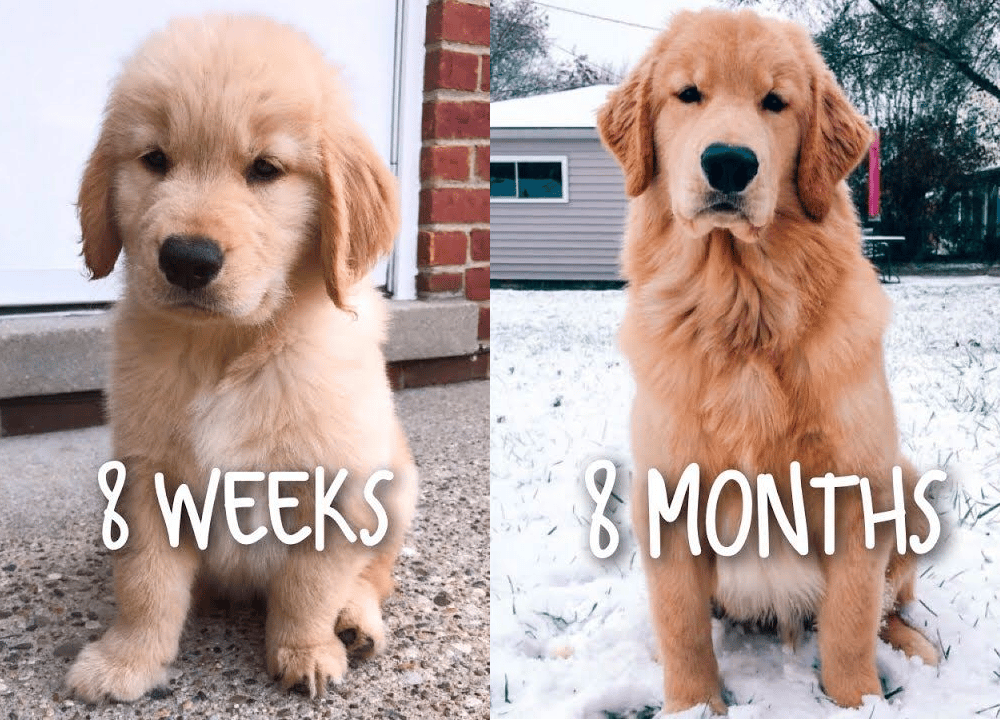
How big do Golden retrievers get: From 8-week-old to 8-month-old.
It’s not easy to hear, but you’re now parenting a teenager.
That means your once adorable ball of fluff has grown into canine adolescence.
They don’t stay puppies forever!
8-Month-Old Golden Retriever Behaviors to Expect
Most Goldens begin entering adolescence around the 6-month mark, so your 8-month-old should be right smack in the middle of its teenager stage.
This stage is going to look different for each dog because they’re unique individuals, just as we are. However, there are some behaviors that are pretty common among canine adolescents that I can give you a head’s up about so you can get prepared for them.
The reason your dog acts up during its teenage phase is that its body is creating hormones that start physical and behavioral changes.
For instance, male dogs may start urine marking during this time.
Instead of getting all the pee out at once like they did when they were a pup, you might notice that your dog will spritz trees, fire hydrants, and other things when you’re out on walks. And they may tag your indoor furniture, as well.
Some females take part in this practice, as well.
Your eight-month-old Golden may start humping objects, other dogs, humans, or you and your family.
If they aren’t spayed, female Goldens will typically go into heat sometime between the ages of 6 and 18 months old. So that’s something you can watch for. For more about this, check out When Do Golden Retrievers Go Into Heat? (Heat Cycle Explained).
Whether male dogs are neutered or not, they’ll definitely be more attracted to females when they’re in heat. But, in-tact males can get female dogs pregnant when they’re in heat, even if your dog is only 8-months-old.
Another thing you’ll likely deal with is the fact that teenaged pups typically don’t listen to commands or requests. They may seem to ignore you. There have even been studies about this, like this one.
The reason for this is that there’s so much going on in their brains during this time that learning and paying attention are difficult for them.
Unfortunately, it can affect their impulse control, too. You’ll see your dog impulsively grabbing things off of counters and tables, or barking at things outside.
Your dog will start exhibiting reactive behaviors toward other dogs during this time, too, even though Golden Retrievers are supposed to be friendly, social dogs.
This means your dog may start barking or lunging at people or other dogs. This is usually because they’re frustrated that they can’t interact with them the way they want to.
If you take your dog around other dogs during this period, there may be some tussles or even fights.
If your dog is getting into stuff while you’re gone, it may be worth checking out this article: Golden Retriever Separation Anxiety: Signs, Causes, and Strategies for Treatment.
If it sounds like a lot, it’s because it is. But it’s all normal, and if you ever get down, just remember it’s even harder on your dog who is actually experiencing all of this.
Is a Golden Retriever Fully Grown at 8 Months?
If you’re dealing with an unruly, bratty teenager, you’re likely looking for some light at the end of the tunnel. The good news is that you don’t have to wait years like you would if you had a human teenager.
Golden Retrievers aren’t considered fully grown until they’re between 18 months and 2 years old.
What an 8-Month-Old Golden Retriever Looks Like
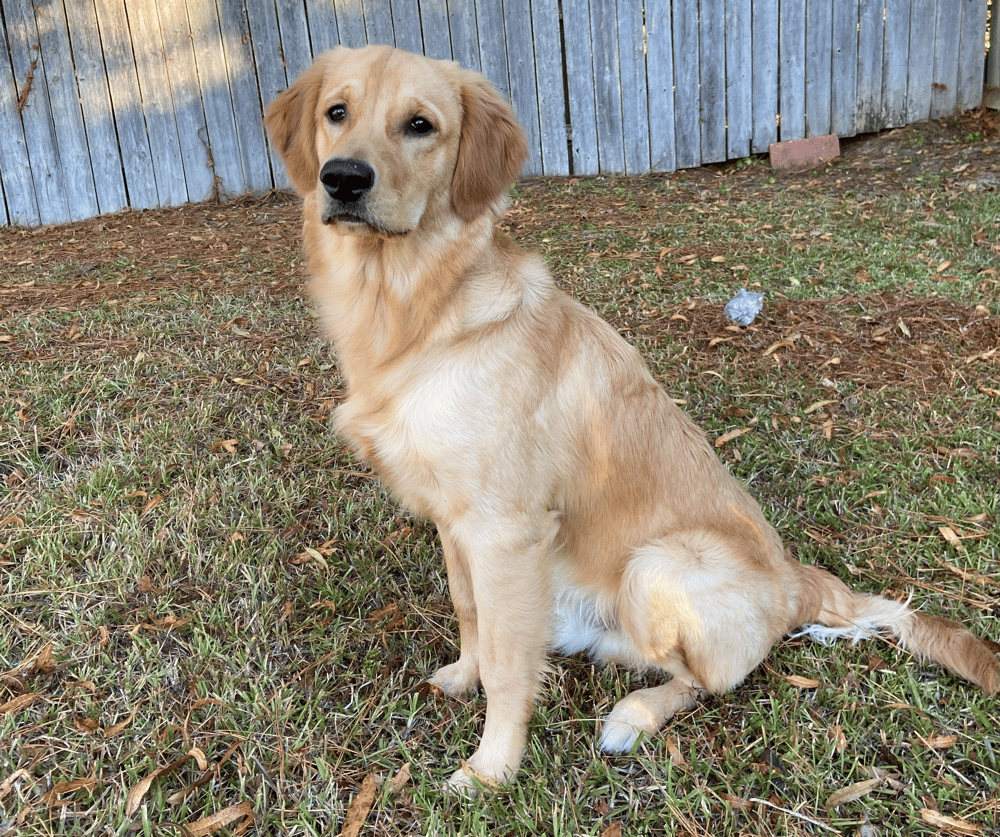
An 8-month-old Golden Retriever should be between 40-60 pounds and around 18- 25’’ tall.
Of course, this varies greatly from dog to dog, and your dog could be larger or smaller than this. If you’d like to know more about the different types of Golden Retrievers and how they differ in size and weight, check out Field Golden Retriever vs. Show Golden Retriever Comparison.
You’re going to notice that your 8-month-old Golden has some weird proportions going on because some parts are growing faster than others. They may look a little silly because of this. It’s all just part of the growing process, kind of like when human teenagers shoot up in height and their voices drop or crack.
8-Month-Old Golden Retriever Sleep Requirements
Your 8-month-old Golden Retriever should be getting somewhere between 16-18 hours of sleep per day.
If your teenager doesn’t get enough sleep, they’ll act up.
They look so similar to adults that it’s easy to forget that they’re still not fully- grown and need sleep to develop properly.
Your pooch will probably sleep through the night easily enough, but you should make sure they’re getting enough sleep during the day.
It’s a good idea to invest in a crate or pen to help your pup take naps, as well as comfortable bedding.
How Much To Feed an 8-Month-Old Golden Retriever
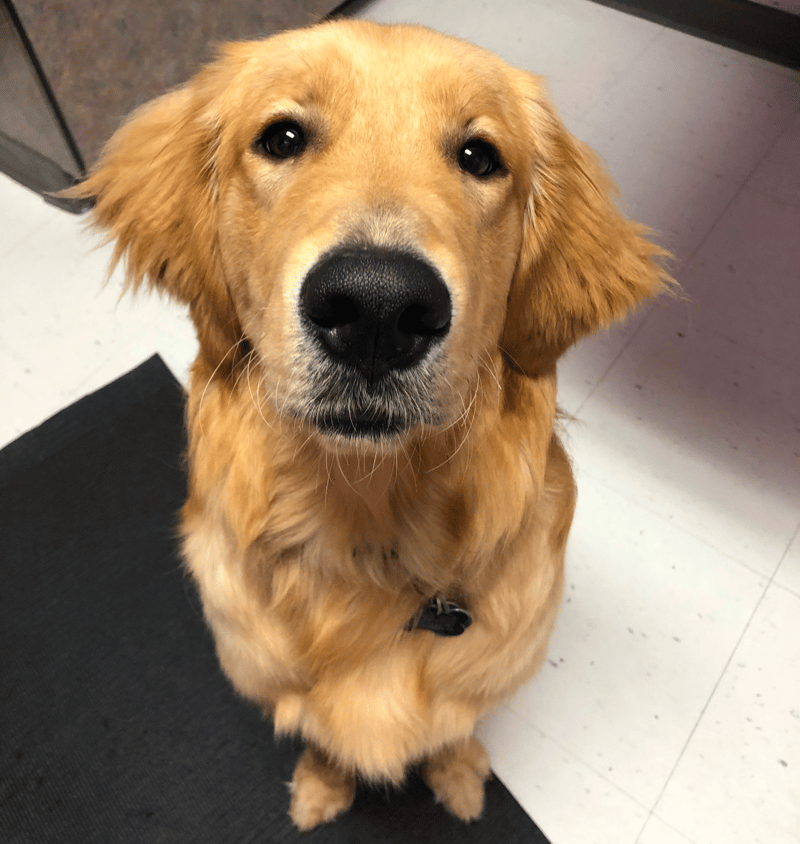
8-month-old Goldens should be eating somewhere between 3-5 cups of food per day, and you should split it up into two separate meals.
Your dog could need more or less than this, and it varies from day to day, but that’s a good general guideline.
Of course, teenagers can eat a lot really fast, so don’t be surprised if your dog wolfs down the food the second you put it out.
Because your dog is still growing, you need to make sure you’re feeding them quality large-breed puppy food. This can prevent injury to their muscles, growth plates, and joints during growth.
You do need to attempt to keep your Golden trim and fit because they’re prone to obesity. They often overeat because they like food. So, closely watch how much your dog is eating. If you’d like to learn more about common health conditions experienced by Goldens, check out our article about Golden Retriever Common Health Issues: Symptoms, Treatments, and Prevention.
How Much Exercise Does an 8-Month-Old Golden Retriever Need?
Your golden has come a long way from its puppy stage when it could only exercise and play for short periods of time. This is music to some peoples’ ears because many people adopt golden retrievers so they’ll have an exercise partner.
When Rolden Retrievers reach 8 months, they can usually handle one or two hours of exercise a day.
Of course, this varies from dog to dog. Some goldens are highly active and athletic, while others are couch potatoes.
You need to find a middle ground where you aren’t overextending your pup, but they’re getting enough exercise to wear them out. This is because if your golden isn’t getting enough exercise they’ll be extra rambunctious and unruly.
Of course, you can always take your golden for a walk to get their exercise in. But many people aren’t aware that goldens are experts at playing fetch because they’re retrievers. They also love water, and swimming is a fun way to get some exercise.
It’s important that you don’t focus solely on physical exercise as goldens are highly intelligent and need mental stimulation, as well. So, play games with your pup and get them puzzle and treat toys to keep them occupied.
How to Deal with Your 8-Month-Old Golden Retriever Chewing, Biting and Jumping on People
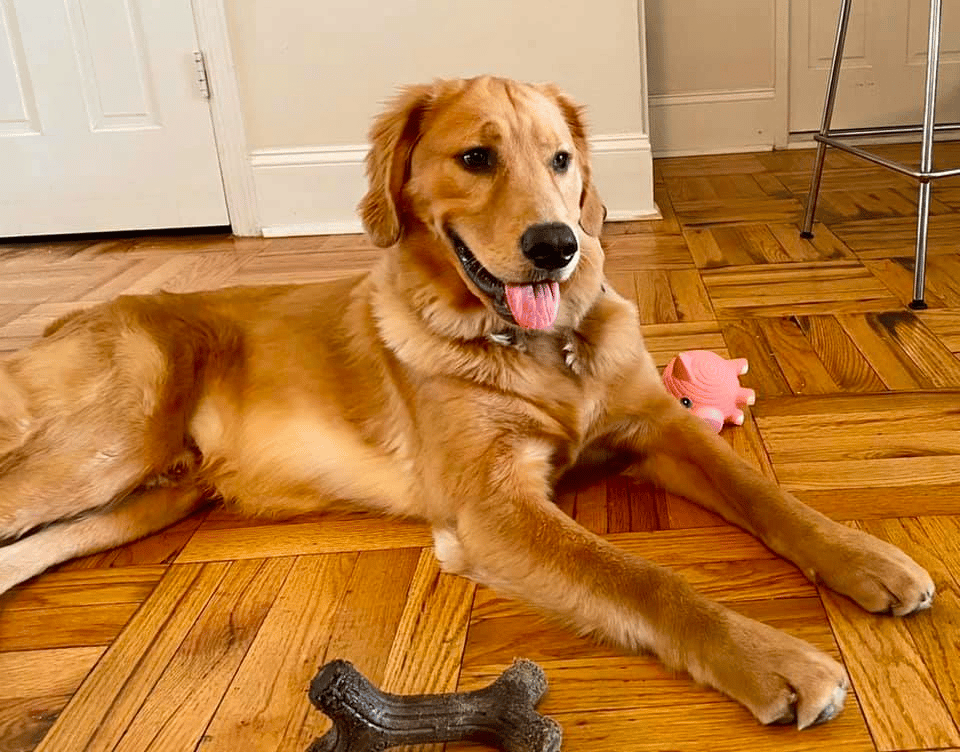
Your dog should be mostly through its teething phase by now, which means they don’t have those tiny little needle teeth anymore (thank goodness!).
But if your dog doesn’t have enough appropriate things to chew on, they’ll start looking for inappropriate things to chew on, like shoes or furniture.
Chew treats are a great option, as loads of chew toys.
If you find your dog engaging in some inappropriate chewing activity, just redirect them to a chew toy or treat.
Many Golden Retrievers love having big stuffed toys that they can carry around in their mouths. This satisfies their natural “mouthiness” (they have a natural tendency to pick things up in their mouths as part of their hunting dog breeding).
You’ll save yourself a lot of trouble if you simply make sure your dog has lots of chewy options available to them during this time.
My dog is currently in her adolescent phase, so I invested in a Bark Box subscription and sprung for the package with the 4 toys a month and extra treats. She likes them because they typically have squeakers, soft toys and crinkly toys all in the same box.
Golden Retrievers are highly social creatures, but because of this and their hyperactive nature, they tend to sort of freak out when they try to greet someone. So, you should work with them to get them to learn how to politely greet people. They’re such big dogs that it’s not a good idea to have an unruly golden retriever jumping up on everyone they see at the park or everyone that comes to your house.
If your golden is jumping on people when they come into your house, then you should pen them up, crate them or put them in another room until the visitor settles in.
Training Your 8-Month-Old Golden Retriever
You’re going to need to remind yourself over and over during this phase that your pup’s brain is going through a lot of development right now, which is going to cause some mixed signals and confusion.
Your dog may forget commands that were once easy for them, like “sit” or “come”, and it may seem that they’ve forgotten their own name.
You’ll probably have several instances where you repeatedly call for your dog and they don’t respond to you at all.
They’re probably regressing a bit, as well. Maybe we’ve started stealing shoes again, stealing food, or peeing inside.
And you may find that they’re doing things that they’ve never done before, and you wouldn’t have ever in a million years dreamed that your well-behaved pup would do.
Of course, this can all be incredibly vexing as a pup parent.
The good news is that even though it seems like you’ve spent tons of time and energy training your dog for no good reason, they haven’t actually forgotten everything you’ve taught the.
It’s still there. It’s more like their brains are under construction and certain parts are being rewired and are down for maintenance at times, which means they have a lot of trouble remembering things.
The key during this time period is consistency. Keep working with your Golden and don’t give up on training.
It’s a good idea to keep training sessions both fun and short. This is going to help both of you in the long run because the longer and more boring they are, the more frustrated you’ll both be.
You should start using higher-quality treats when you’re in places with lots of distractions. A tasty bacon treat or some chicken is more likely to catch your dog’s attention than kibble.
You may need to adjust a bit, too. If your dog keeps getting into the trash when you’re not looking, then maybe you should hide the trash can somewhere they can’t get to it until they’re out of this phase. Maybe you hide shoes and other objects that your dog seems interested in stealing or chewing, as well.
My dog is currently a shoe bandit, which is sort of a change from when she was a puppy and would eat my bras. (No matter how fancy or expensive they were!)
Your best bet during this phase is to reward positive behaviors. Golden Retrievers respond well to positive reinforcement training. So if you notice your dog is sitting patiently while you’re cooking dinner, or resting quietly during the afternoon, give them a treat.
They’ll eventually get to the point that they understand which behaviors are acceptable because you’ll reward them and praise them for their good behavior. And honestly, your Golden will just eat up that praise and attention, which is adorable. It may not quite make up for all of the destruction they’ve caused, but it sure does make you forget about it for a minute!
Golden Retrievers are highly social creatures, but because of this and their hyperactive nature, they tend to sort of freak out when they try to greet someone. So, you should work with them to get them to learn how to politely greet people. They’re such big dogs that it’s not a good idea to have unruly Golden Retrievers jumping up on everyone they see at the park or everyone that comes to your house.
Here are some other areas you should be training your Golden Retriever in:
- Getting their attention and keeping their focus
- Commands like “down”, “stay”, and “sit”
- Walking on a long or loose leash
- Laying down on their bed or mat
- Cooperating while being groomed
- Teaching them “drop it” and “leave it”
- More lessons on how to be polite both in the house and in public.
It’s important to remember if your training lessons aren’t going well and you’re both frustrated, then take a break. You can pick it back up later, or the next day.
Training isn’t just about teaching your dog new things, but also about bonding, so if that’s not happening and it doesn’t feel fun, then it’s time to stop for a bit.
Conclusion
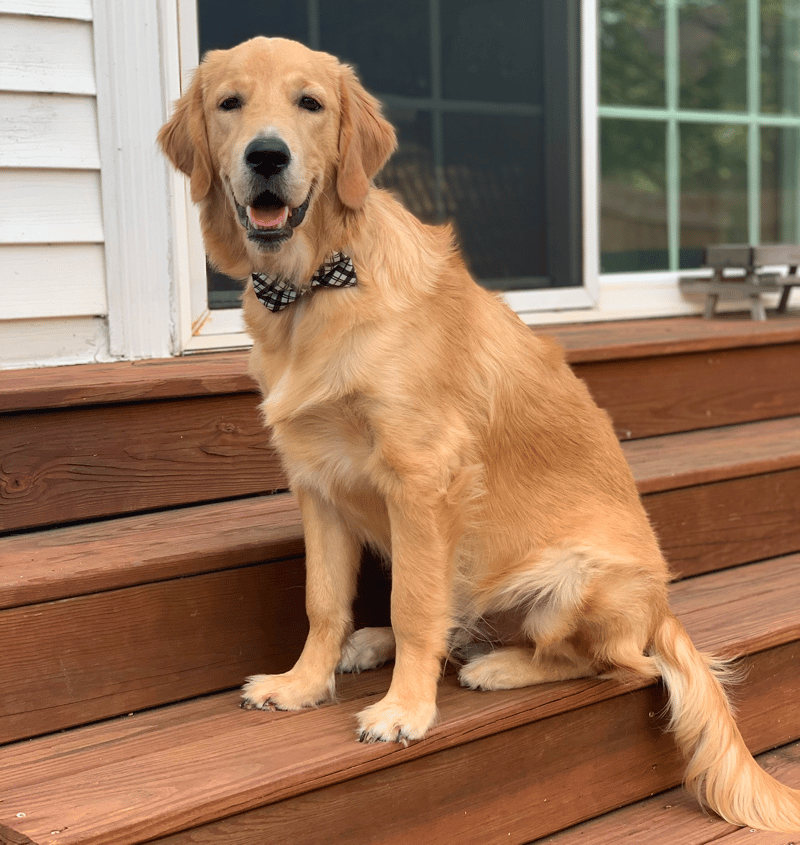
The best advice I can give you as a teenaged pup parent myself is: “this too shall pass.” It may pass like a kidney stone, but it will pass.
The teenage phase is typically over sometime between 18 months and 3 years of age. So, you still have a while to go.
You’ll definitely have days where you’re pulling your hair out and at your wit’s end with your Golden.
Take deep breaths when things are going wrong, and praise the victories when they come.
If you keep up with training and bonding with your dog, then you’ll have one of the best friends you could ask for to share your life with, so it’s worth it!
Here’s the rest of this series in case you missed it:
- The 5 Stages of Golden Retriever Puppy Growth
- 6-Week-Old Golden Retriever: Developmental Milestones to Expect and Mistakes to Avoid
- 8-Week-Old Golden Retriever: Growth, Developmental and Behavioral Expectations
- 3-Month-Old Golden Retriever: Training, Feeding, Sleeping
- 4-Month-Old Golden Retriever: Training, Feeding, and Behaviors
- 5-Month-Old Golden Retriever: Behaviors, Feeding, and Training
- 6-Month-Old Golden Retriever: What to Expect from Canine Adolescence
- 7-Month-Old Golden Retriever: Full-Blown Adolescence And You
- 12-Month-Old Golden Retriever: A Journey into Adulthood
- 2-Year-Old Golden Retriever: Full-Grown, Adulthood, Playful
- Senior Golden Retriever: Signs of Aging and How to Care for Your Old Dog
